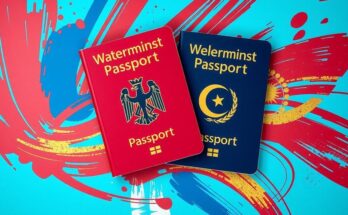Saudi Arabia’s stunning advancements overshadow a grim reality of widespread human rights violations. Executions are rising, women face systemic discrimination, and fair trials are nearly nonexistent. Activists are routinely silenced, while the rights of LGBTQI+ individuals are non-existent. The struggle for basic human dignity continues amidst forced evictions and a blatant crackdown on free speech and assembly.
In the vibrant landscape of Saudi Arabia, where ambitious skyscrapers touch the sky and international sports events capture attention, a darker reality lurks beneath the surface. Human rights violations mar the glittering facade, as citizens endure severe penalties for expressing dissent or simply attempting to live with dignity. Blogger Raif Badawi’s case, sentenced to 1,000 lashes for advocating free speech, starkly illustrates the oppressive climate—his ongoing travel ban leaving him estranged from family for years. This is just a glimpse into the myriad ways in which Saudi Arabia systematically undermines the rights of its people. From escalating executions—196 in 2022 alone, crowned by a mass execution of 81 individuals in one day—to the reinforcement of a male guardianship system stifling women’s autonomy, the Kingdom’s human rights record is plagued with egregious violations. Trials often lack fairness, with arbitrary detentions of migrants, who are tortured and forcibly returned, becoming tragically common. The fate of Salma al-Shehab, sentenced to 27 years for tweets supporting women’s rights, highlights a judicial system that operates without basic principles of justice. Meanwhile, migrant workers face exploitation, with a harsh crackdown leading to the arrest and deportation of thousands. In the suffocating grip of censorship, the media are state-controlled, leaving journalists like Jamal Khashoggi vulnerable to assassination for daring to criticize. The specter of oppression looms continuously over dissenters, with many activists silenced or imprisoned. LGBTQI+ individuals, labeled as extremists, navigate a treacherous existence amidst grave legal repercussions for their identity or relationships. Amidst this turmoil, freedom of movement is curtailed by travel bans, and the reality for over half a million residents in Jeddah is one of forced evictions from homes to make way for lavish developments. Protests are suppressed under threat of incarceration, leaving citizens voiceless and powerless in the face of tyranny. Saudi Arabia’s gleaming veneer belies a heart of darkness where human rights remain a distant dream. While the world watches the Kingdom host the men’s World Cup and showcase extravagant projects, it is crucial to remember the severed ties of individuals like Raif Badawi. Human rights must be protected, not just in Saudi Arabia, but wherever they are threatened.
The backdrop for this discourse on human rights in Saudi Arabia is framed by stark contradictions. The Kingdom, known for its economic growth and cultural events, presents an image of modernization. However, beneath this progressive facade lies a troubling attitude towards basic human freedoms. The increase in executions, pervasive discrimination against women, a lack of free speech, and systematic oppression of minorities paint a sobering picture of life for many Saudis. This juxtaposition exposes not only the complexities of Saudi society but also the urgent need for human rights advocacy.
In conclusion, Saudi Arabia’s glitzy appearances do little to mask the harsh reality faced by its citizens. Human rights abuses are rampant, from the grave injustices in legal proceedings to blatant discrimination against women and vulnerable communities. The kingdom’s systematic suppression of dissent and marginalized identities reveals a clear and urgent need for international attention and action. Observers must not only celebrate the nation’s achievements but also hold it accountable for the human rights violations that plague its society.
Original Source: www.amnesty.org.uk



